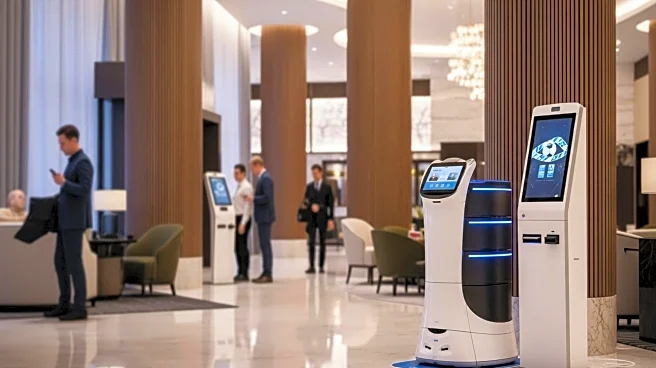What's Happening?
The hospitality industry is undergoing a significant transformation with the integration of cloud technology, mobility, and artificial intelligence (AI). These advancements are reshaping hotel operations by enabling staff to interact more freely with guests, improving service delivery, and enhancing overall guest experiences. Cloud-based systems have become the standard, allowing real-time updates and seamless integration with other tools, which facilitates faster innovation and ensures data security. AI is being utilized for tasks such as profile matching, guest preference prediction, and smart room assignments, leading to efficiency gains of 10-20% in common tasks. However, the successful implementation of these technologies requires modernizing core systems and ensuring staff buy-in and training.
Why It's Important?
The integration of AI and cloud technology in the hospitality sector is crucial for enhancing guest experiences and operational efficiency. By freeing staff from traditional constraints, these technologies allow for more personalized and attentive service, which is essential for maintaining competitiveness in the industry. The ability to offer luxury-level attentiveness at scale can level the playing field for select-service hotels, enabling them to compete with high-end brands. This transformation is not just about operational efficiency but about creating experiential differentiation, making guests feel seen, supported, and remembered. As the industry moves forward, the focus will be on using technology to enhance human interaction rather than replace it.
What's Next?
For hotel leaders, the next steps involve prioritizing the modernization of foundational systems, such as cloud-based property management systems (PMS), to enable the full potential of mobility and AI. Training staff to confidently use mobile tools and AI will be essential for redefining guest interactions and improving service delivery. The industry must also avoid common pitfalls such as implementing AI without addressing outdated infrastructure or poor data hygiene, and deploying new technologies without clear guest benefits. The focus should be on using technology to reduce friction and enhance guest care, rather than merely cutting costs.
Beyond the Headlines
The deeper implications of these technological advancements in hospitality include ethical considerations around data privacy and the potential for AI to inadvertently replace human jobs. Ensuring that technology enhances rather than detracts from the guest experience is crucial. The industry must balance the excitement of new technologies with readiness and practicality, ensuring that innovations are implemented thoughtfully and sustainably. The long-term shift will likely see a greater emphasis on experiential differentiation, where technology supports rather than overshadows human interaction.











